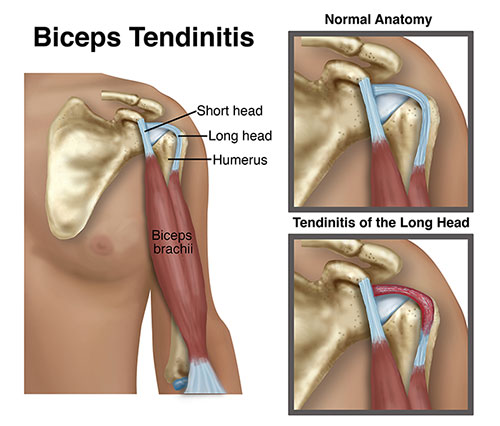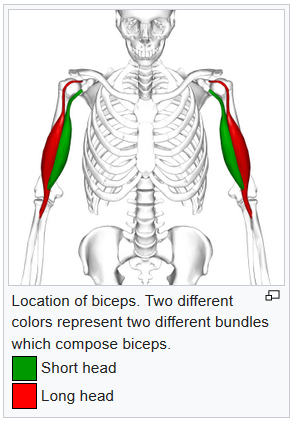nalco group
bone, muscle & joint pain physio
BOOK NOW / WHATSAPP ABOUT YOUR PAIN OR INJURY
- ORCHARD 400 Orchard Road #12-12 Singapore 238875
- TAMPINES 9 Tampines Grande #01-20 Singapore 528735
- SERANGOON 265 Serangoon Central Drive #04-269 Singapore 550265
Home > Blog > Physiotherapy & Hand Therapy > Conditions > Biceps Tendinitis Physiotherapy
Biceps Tendinitis Physiotherapy

Biceps tendinitis is actually a quite common cause of
- shoulder pain and
- shoulder impingement (compression of tissue with movement)
Biceps tendinitis often happens to individuals who perform repetitive, overhead movements.
It also usually is a progressive condition ie develops over time, with pain located at the front of the shoulder, and usually worsens with continued aggravating activity/exercise.
When treating biceps tendinitis, our senior physiotherapists and hand therapists
- work to determine the exact source of the pain by assessing the entire shoulder
- prescribe a program of activity modification, stretching, and strengthening to resolve pain and return patients to their desired activities
What is Biceps Tendinitis?

Tendinitis is a condition in which inflammation progressively worsens and accumulates at a tendon, causing pain.
The our biceps tendon, the tendon associated with the biceps muscle, is made up of 2 parts (see picture):
- the long biceps head
- the short biceps head
The long head of the biceps is the one that is most commonly affected by tendinitis, as the tendon from the muscle runs up the length of the arm and attaches to the labrum (a rim of cartilage) and the shoulder blade in the shoulder joint.
Biceps tendinitis happens when there is excessive, abnormal forces are applied across the tendon, including
- tension (a pulling of the muscle and tendon)
- compression (pushing or pinching)
- shearing (rubbing).
When the tendon is subjected to repetitive stresses, it can become irritated, swollen, and painful.
There are many factors that may lead to biceps tendinitis, including:
- Activities requiring repetitive overhead movement of the arms, such as placing dishes in a high cupboard or lifting boxes above the head.
- Rotator cuff injuries and tears
- Weakness in the rotator cuff and muscles of the upper back
- Shoulder joint hypermobility (looseness)
- Shoulder joint stiffness
- Shoulder joint muscle tightness
- Poor body mechanics (how a person controls their body when moving)
- An abrupt increase in an exercise routine (increasing exercise intensity/frequency too fast)
- Age-related body changes
- Other pathology within the shoulder joint
How Does Biceps tendinitis Feel like?
If you are experiencing biceps tendinitis, you may feel:
- Sharp pain in the front of your shoulder when you reach overhead, behind your back, or across your body
- Tenderness to touch at the front of your shoulder
- Pain that may radiate toward the neck or down the front of the arm
- Dull, achy pain at the front of the shoulder, especially following activity
- Weakness felt around the shoulder joint, usually experienced when lifting or carrying objects or reaching overhead
- A sensation of "catching" or "clicking" in the front of the shoulder with movement
- Pain when throwing a ball
- Difficulty with daily activities, such as reaching behind your back to tuck in your shirt, or putting dishes away in an overhead cabinet
- Pain when resting that may become worse at night
How Is biceps tendinitis Diagnosed
When you first see our senior physiotherapist, they will
- review your medical history
- ask you to describe your shoulder condition
- perform a comprehensive physical exam of your shoulder and upper body
They will assess different measures, such as sensation, motion, strength, and flexibility, and may ask you to briefly perform the activities that cause your pain.
They will likely touch various areas on your shoulder to see which seem to be most consistently painful. Other nearby areas, such as your neck and upper back, also will be examined to determine whether they might be contributing to your shoulder pain.
Imaging techniques, such as an X-ray or MRI, are typically not needed to diagnose biceps tendinitis.
However, in the event that our senior physiotherapists suspects there are other conditions possibly present in your shoulder, you may be referred to an orthopedic surgeon for further investigation.
how our senior physiotherapist can help

Once biceps tendinitis has been diagnosed, our senior physiotherapist s
will work with you to develop an individualized plan tailored to your
specific shoulder condition and your goals. There are many physiotherapy treatments that have been shown to be very effective in treating biceps tendinitis
Your treatment may include:
Range-of-motion exercises. Often, abnormal motion of the shoulder joint may contribute to biceps tendinitis. We will assess your shoulder motion compared to the expected normal motion and to the motion of your other shoulder. We will guide you through exercises to improve your shoulder’s range of motion.
Muscle strengthening exercises. The muscles of the shoulder and upper back work together to allow for normal, coordinated upper-body motion. Based on the way the shoulder joint is designed (a ball-and-socket joint, like a golf ball on a golf tee), there are many directions in which the shoulder may move. Therefore, balanced strength of all the upper-body muscles is crucial to make sure the shoulder joint is protected and is moving efficiently. We will choose exercises to safely strengthen the muscles around your shoulder without causing more pain.
Manual therapy. We are trained in manual (hands-on) therapy. We will gently move and mobilize your shoulder joint and surrounding muscles as needed to improve their motion, flexibility, and strength. These techniques can target areas that are difficult to treat on your own.
Pain management. We may recommend therapeutic modalities, such as cold therapy and heat therapy, to aid in pain management, and reduce the need for medication, including opioids.
Functional training. Improper movements can, over time, cause pain in the body. Our senior physiotherapists are experts in assessing movement quality and in training people to function at their best. We will point out and correct any movements that could be causing you trouble, so you can maintain a pain-free shoulder throughout your daily activities. Often, the strategies learned through specific education from our senior physiotherapist will allow you to avoid reversing the positive effects of your physiotherapy, and help make sure that your improvements last.
